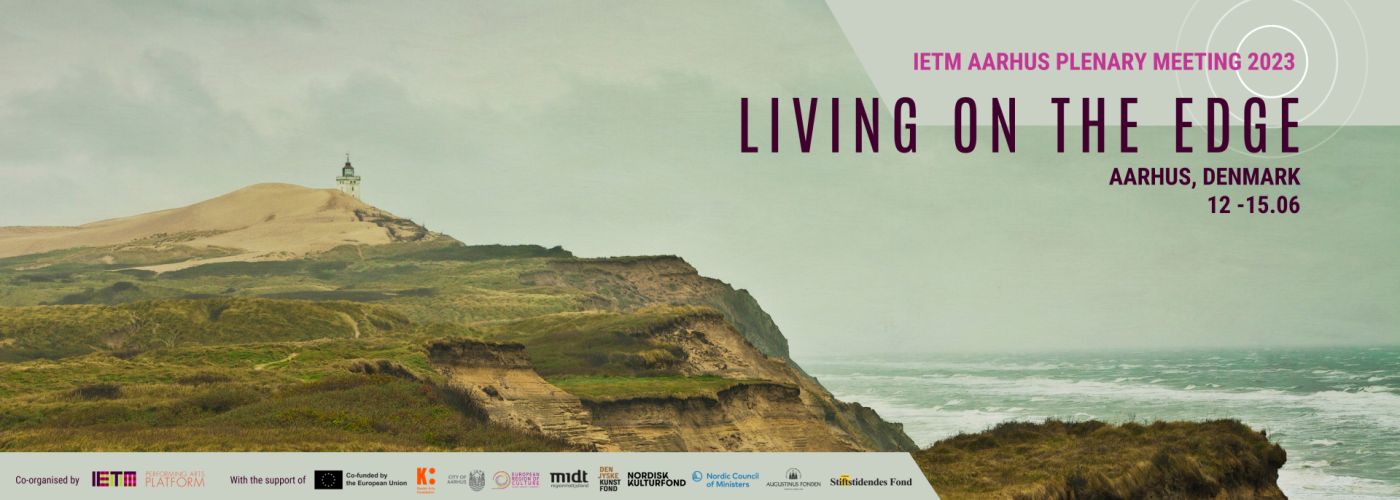Programme Transparency Note
What has been the intention behind the IETM Aarhus programme?
Broadly speaking, the main idea behind the programme was to tackle climate change and environmental protection through its social and cultural aspects.
Following IETM’s current translocal approach - which aims to proactively encourage and enable members to articulate and (re)connect with their understanding of the local through learning, reflecting and conveying their local narratives in international conversation - the IETM Aarhus programme aims to root itself in the local context and to have strong Nordic representation.
We envision the curated programme as a starting point for an international conversation that deeply resonates with colleagues' own experiences on various levels, while maintaining a strong connection to the local context.
We have approached the meeting's topic very seriously, carefully considering the context and the discussions surrounding it. We have chosen to address sensitive yet crucial issues such as, economic disparities, colonisation, land seizure, cultural oppression, and narrative monopoly. Additionally, we have made an effort to provide a platform for opposing perspectives and less mainstream worldviews. This has been a vulnerable process, as it extended beyond our own understanding and authority. However, we firmly believe that it is necessary to confront such a vital subject by acknowledging and surpassing our own limitations.
We hope you understand that each choice we made was driven by a necessity. It's important to acknowledge that this dialogue proposal represents only a partial and specific perspective which hopefully will provoque and spark passionate but respectful reactions.
Speakers: our diversity and inclusion approach for this meeting
Every local reality has its unique set of inclusion and diversity challenges, along with its own minority groups. These issues can vary significantly from one place to another and diversity may not always manifest in a way that is familiar to you. Like all IETM meetings, IETM Aarhus serves as an opportunity to delve into the local history and context, allowing us to gain a deeper understanding of who is present in the room and who is not, specifically within the local context.
While we make every effort to offer opportunities to emerging voices and underrepresented groups, it is important to note that our intention was not to select speakers as mere tokens of any particular group. It has never been our intention to have one person represent a world region or people. Each speaker should be considered in their integrity and has been invited to share their particular experience and expertise.
All speakers have been invited to contribute to the meeting within the same timeline and with equal or equitable conditions. Please note that if a speaker delivers their speech online , it has either been their own choice or because of external impediments beyond our influence.
Speakers are provided with support and resources to help them prepare for their sessions, including guidelines, preparation and rehearsal opportunities.
In terms of travel and accommodation, we prioritise land travel whenever possible and we always suggest the most convenient travel possible for the speaker, covering stops and accommodation costs for long trips. We also accommodate particular requests and travel conditions and whenever required, support workers costs are also covered.
We work closely with the speakers to coordinate logistics, including travel arrangements, accommodation, presentation preparation and any other necessary details in order to give them the best conditions possible.
Programme curation process
The curation of the IETM programme is initiated by the local content and artistic committees, in partnership with the local organiser and the IETM Secretariat. To ensure a comprehensive approach, at least two consultation sessions are held with the IETM advisory committee, which provides direct feedback on the topics, suggested speakers, formats, and more, and offers concrete proposals for the program. Additionally, all members are encouraged to contribute with suggestions for future meetings through our feedback forms and the IETM forum.
Beyond the curated programme, IETM meetings also host regular membership sessions, as well as networking sessions such as the ‘Who’s there?’, ‘Meet the Global Connectors’, the General Assembly,‘Talks and Listens’, ‘Pitchorama’ and the ‘Mentor Room’. These sessions are led by members. Sessions organised by IETM working groups are independently curated with the support of the IETM Secretariat and the local organiser who connect the group leaders to the local scene for a more rooted exchange.
Speakers compensation
All speakers and moderators invited to contribute to the curated programme of an IETM meeting are offered a symbolic honorarium and we also cover their travel and accommodation costs.
There is no specific financial support provisioned for IETM working groups, neither for their contact persons nor for any speakers or experts that the group might want to involve. However, whenever the budget allows, we add travel costs and honoraria related to the working groups to our speakers budget and we distribute the budget evenly between all working groups.
Mentors and buddies are currently not compensated for sharing their time, contacts and insights with fellow members, nor are participants pitching or presenting their projects.
As a rule, speakers' honorariums are non-negotiable and are relative to the role fulfilled. Our priority is to distribute our budget equitably between all speakers. The compensation we offer to speakers is not to be negotiated in relation to merit and value, as we believe that all speakers are equally valuable to the programme and it is not up to us to decide who has more merit. Nevertheless, we can negotiate financial compensations, according to specific access needs and we prioritise independent workers, low income organisations, support workers and caretakers.

